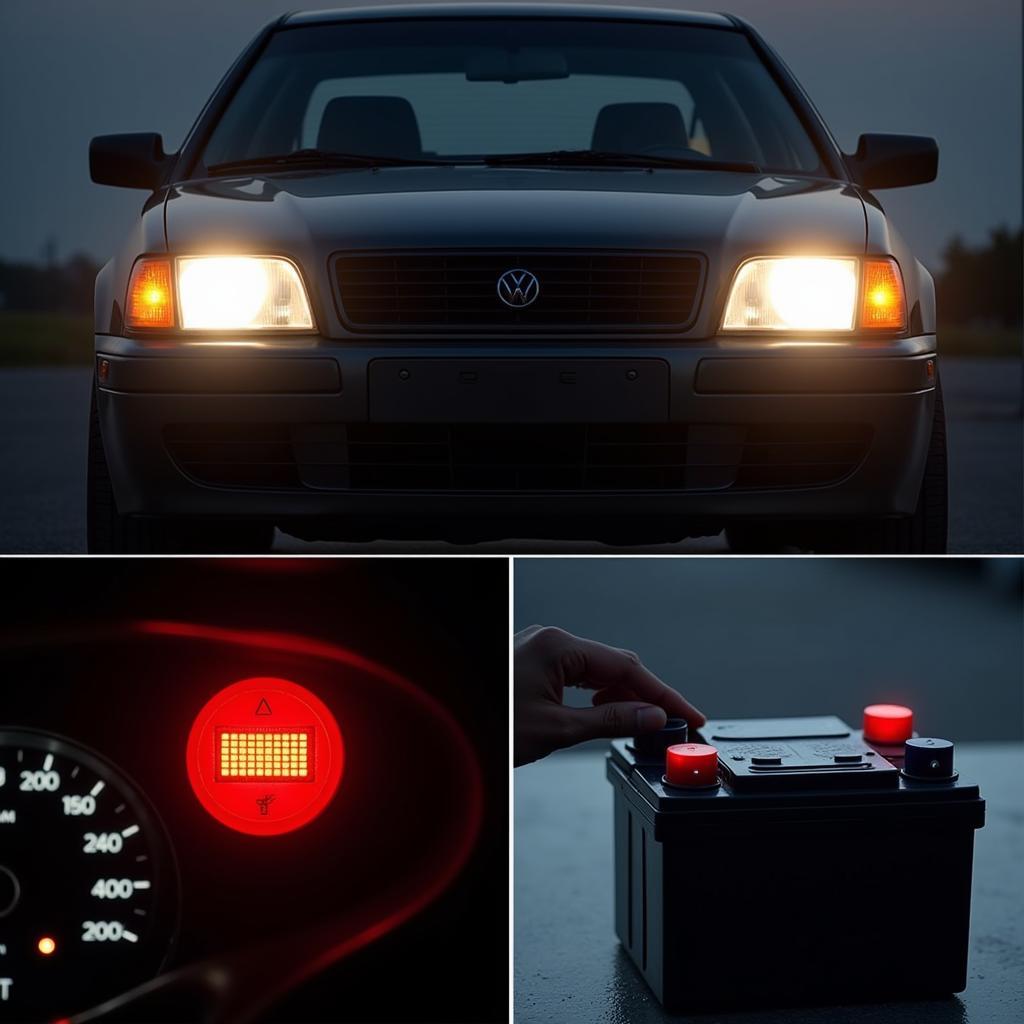Diagnosing a bad car battery is often the first step in troubleshooting car starting problems. A weak or dead battery can leave you stranded, but with a few simple checks, you can determine if your battery is the culprit and take the appropriate action. Let’s explore how to diagnose a bad battery and get you back on the road.
Common Signs of a Bad Car Battery
A dead battery is more than just an inconvenience. It’s often a sign of underlying issues that need to be addressed. Here are some of the most common indicators that you might be dealing with a bad battery:
- Slow Cranking: The engine cranks slowly or struggles to turn over.
- Dim Headlights: Headlights appear dimmer than usual, especially when the engine isn’t running.
- Clicking Sound When Turning the Key: This clicking sound indicates the starter motor is trying to engage but lacks sufficient power from the battery.
- Electrical Malfunctions: Problems with interior lights, radio, power windows, or other electrical components can be a symptom of a failing battery.
- Dashboard Warning Light: The battery or charging system warning light may illuminate.
- Swollen Battery Case: Excessive heat can cause the battery case to swell or bulge, indicating internal damage.
- Old Age: Batteries typically last 3-5 years. An older battery is more likely to fail.
 Bad Car Battery Symptoms
Bad Car Battery Symptoms
How to Test Your Car Battery
Testing your car battery is crucial for confirming a diagnosis. Here’s how you can do it:
- Visual Inspection: Check for any visible signs of damage, such as cracks, leaks, or corrosion around the terminals.
- Multimeter Test: A multimeter can accurately measure the battery’s voltage. A fully charged battery should read around 12.6 volts. A reading below 12.2 volts suggests a problem.
- Load Test: A load test measures the battery’s ability to hold a charge under load. This test is usually performed with a specialized battery tester.
- Starter Test: While less common for DIY diagnosis, a starter test can determine if the starter is drawing excessive current, which can drain the battery.
What Causes a Bad Car Battery?
Understanding the underlying cause of a bad battery can help prevent future issues. Several factors can contribute to a battery’s demise:
- Extreme Temperatures: Both extreme heat and cold can shorten a battery’s lifespan.
- Parasitic Drain: Electrical components drawing power even when the car is off can drain the battery.
- Overcharging or Undercharging: A faulty alternator can overcharge or undercharge the battery, leading to premature failure.
- Short Circuits: A short circuit can quickly drain and damage a battery.
- Old Age: As batteries age, their internal components degrade, reducing their capacity to hold a charge.
“Regular battery testing is essential for maintaining a healthy car,” advises John Smith, ASE Certified Master Technician. “Don’t wait until you’re stranded to discover a bad battery.”
What to Do with a Bad Car Battery
If you’ve determined your battery is bad, you have a few options:
- Jump-Starting: Jump-starting can get your car running temporarily but doesn’t address the underlying battery problem.
- Battery Replacement: Replacing the battery is the most common solution for a bad battery.
- Charging the Battery: A slow trickle charger can sometimes revive a slightly discharged battery. However, if the battery is severely damaged, replacement is often necessary.
“Remember to properly dispose of your old battery,” adds John Smith. “Many auto parts stores offer recycling programs.”
Diagnosing a Bad Battery: Key Takeaways
A bad battery can be a frustrating experience, but by knowing how to diagnose and address the issue, you can avoid being left stranded. Regular maintenance and timely replacement can ensure your car starts reliably every time. If you’re unsure about any of the steps, consult a qualified mechanic or automotive technician.
FAQ
-
How long does a car battery last? Typically, car batteries last 3-5 years.
-
Can I jump-start a car with a completely dead battery? Yes, but it might take multiple attempts or a more powerful jump starter.
-
How do I know if my alternator is bad? Symptoms of a bad alternator include dim headlights, flickering lights, and a battery warning light.
-
Can a bad battery cause other car problems? Yes, a failing battery can put strain on other electrical components.
-
How much does it cost to replace a car battery? The cost varies depending on the type of battery and the vehicle, but it typically ranges from $100 to $300.
-
Is it safe to touch a car battery? Yes, but it’s important to avoid touching both terminals simultaneously, as this can cause a shock.
-
Can I charge a completely dead car battery? Sometimes, but if the battery is severely damaged, it may not hold a charge. You can take the help of remote diagnostic service like described in 2008 chrysler aspen brake warning light.
